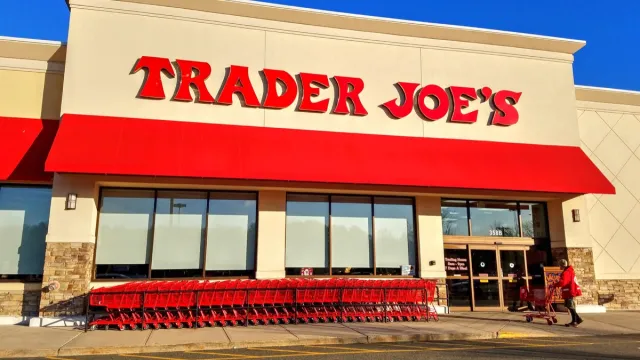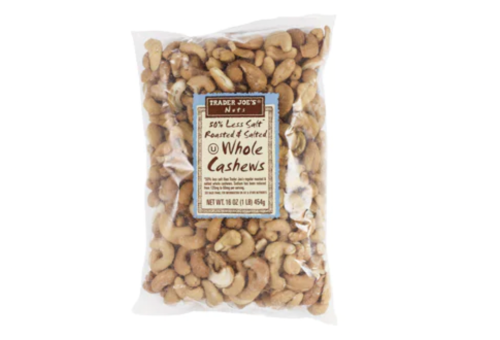Trader Joe’s Nuts Sold in 16 States Are Being Recalled for Possible Salmonella

Because they can be easily enjoyed on the go or to satiate a late-night craving, Trader Joe’s cashews are a mainstay on many grocery lists. But if you recently snagged a bag, you’ll want to hold off on making any homemade trail mix: TJ’s low-sodium, roasted cashews are being recalled over a potential Salmonella contamination.
RELATED: Kroger Chicken Salad Sold in 12 States Is Being Recalled.
On March 18, Wenders LLC issued a recall of Trader Joes Nuts – 50% Less Sodium Roasted & Salted Whole Cashews, which may have come in contact with Salmonella, per a notice posted by the U.S. Food & Drug Administration (FDA). More than 15 states have been impacted by the recall, particularly those in western regions.
According to the release, Wenders LLC was notified of the contamination issue following routine FDA testing that revealed “at least one of the recalled lots tested positive for the presence of Salmonella” upon import.
“Salmonella [is] an organism which can cause serious and sometimes fatal infections in young children, frail or elderly people, and others with weakened immune systems,” the company warned in the release.
More specifically, Salmonella targets the intestinal tract, which is why those with the infection may experience diarrhea, fever, nausea, and stomach cramps, explains the Mayo Clinic. In healthy people, symptoms typically occur within eight to 72 hours after exposure and resolve on their own without medical treatment. However, medical assistance may be needed if the person is severely dehydrated and producing bloody stool, or if symptoms appear to be getting worse, per the Mayo Clinic.
As of this reporting, there have been no reports of illness.
And Trader Joe’s isn’t the only company whose cashew products have been pulled from shelves recently. On March 13, Walmart’s honey-roasted cashews were voluntarily recalled over mislabeled, unknown milk and coconut allergens. In other recall news, Trader Joe’s Steamed Chicken Soup Dumplings were removed from freezer aisles earlier this month after customers found plastic bits in their food.

As for the most recent recall, wholesale distributor Wenders LLC says customers can verify whether their TJ’s cashews are impacted by the recall by noting the Stock Keeping Unit (SKU) number—”37884”—or the “Lot No.”—”T12139,” “T12140,” “T12141,” or “T12142”—which is located on the “back panel of the plastic pouches.”
Additionally, customers can reference the lot code’s corresponding “best before date,” which can also indicate whether your package was affected. Lot code “T12139” has an expiration date of “Feb. 21, 2025,” while “T12140” has one of “Mar 01, 2025” and code “T12141” has one of “Mar 08, 2025.” Lot code “T12142” has an expiration date of “Mar 10, 2025.”
The low-sodium, roasted cashews were distributed to Trader Joe’s locations in 16 different states: Alabama, Arkansas, Arizona, California, Colorado, Idaho, Kansas, Louisiana, New Mexico, Nevada, Oklahoma, Oregon, Tennessee, Texas, Utah, and Washington.
Wenders LLC is urging customers to return any packages that may be contaminated to their nearest Trader Joe’s for a full refund. Consumers can contact the company at [email protected] with any questions.